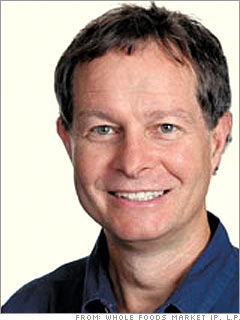Whole Foods CEO John Mackey slimmed down the grocery chain's executive salaries, resulting in a healthier, happier company.
His pricey produce has earned his company the nickname Whole Paycheck -- but Whole Foods Market (
WFMI) CEO John Mackey's own paycheck won't buy him a carton of organic OJ.
Last November, Mackey slashed his salary from $1 million to $1. He's not the first CEO to work for a buck: Steve Jobs and the Google (
GOOG) founders also pay themselves a dollar a year. But those Silicon Valley titans still collect stock options worth millions. Mackey has gone the extra shopping aisle, donating all proceeds from his future options to charity.
And he expects all his executives to make similar, if smaller, sacrifices. For nearly 20 years, the company Mackey co-founded in 1980 has capped compensation for top management. Today it limits executive pay to 19 times the average full-time worker's salary.
To be sure, Mackey isn't hurting. He has raked in $9 million in total compensation since 2002. But that's chump change for a big-name CEO: The average chief executive of a company with at least $1 billion in annual revenue makes nearly $11 million in a single year. That's 262 times what the average worker earns, according to the latest figures from the Economic Policy Institute.
A CEO who doesn't line his own pockets first might seem almost un-American. But Mackey doesn't skimp on his own pay to prove a political point. To him, it's simply good business. "Fewer things harm an organization's morale more than great disparities in compensation," he says in an interview at the company's Austin headquarters. "When a workplace is perceived as unfair and greedy, it begins to destroy the social fabric of the organization."
Whole Foods has thrived under Mackey's leadership, growing from one small natural-foods store in Austin into the world's leading retailer of natural and organic foods. It has nearly 200 stores and last year rang up sales of more than $5.6 billion. Net profit is more than $200 million. And Whole Foods's 42,000 employees seem to be happy with the way the company is run. It ranked No. 5 on
Fortune magazine's 2007 edition of the "100 Best Companies to Work For" --making the list for the 10th year in a row.
Mackey is not without his critics, least of all on Wall Street. After hitting a high of $80 a share in January 2006, Whole Foods plunged to $45 as competitors flooded the market with organic offerings. But Mackey doesn't give a damn -- he's in the race for the long haul. "Don't buy our company's stock," he says in his Texas twang, "if you're looking for quick profits. Some of my ideas seem contrarian now, but capitalism is very dynamic. Eventually, businesses that focus strictly on profits will be voted out."

